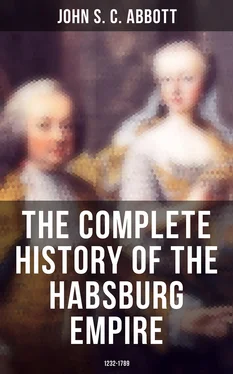It will be remembered that Maximilian's son Ferdinand, who was brother to Charles V., had married Anne, daughter of Ladislaus, King of Hungary and Bohemia. Disturbances in Spain rendered it necessary for the emperor to leave Germany, and for eight years his attention was almost constantly occupied by wars and intrigues in southern Europe. Ferdinand was invested with the government of the Austrian States. In the year 1521, Leo X. died, and Adrian, who seems to have been truly a conscientious Christian man, assumed the tiara. He saw the deep corruptions of the Church, confessed them openly, mourned over them and declared that the Church needed a thorough reformation.
This admission, of course, wonderfully strengthened the Lutheran party. The diet, meeting soon after, drew up a list of a hundred grievances, which they intreated the pope to reform, declaring that Germany could no longer endure them. They declared that Luther had opened the eyes of the people to these corruptions, and that they would not suffer the edicts of the diet of Worms to be enforced. Ferdinand of Austria, entering into the views of his brother, was anxious to arrest the progress of the new ideas, now spreading with great rapidity, and he entered—instructed by a legate, Campegio, from the pope—into an engagement with the Duke of Bavaria, and most of the German bishops, to carry the edict of Worms into effect.
Frederic, the Elector of Saxony, died in 1525, but he was succeeded by his brother John the Constant, who cordially embraced and publicly avowed the doctrines of the Reformation; and Luther, in July of this year, gave the last signal proof of his entire emancipation from the superstitions of the papacy by marrying Catharine Bora, a noble lady who, having espoused his views, had left the nunnery where she had been an inmate. It is impossible for one now to conceive the impression which was produced in Catholic Europe by the marriage of a priest and a nun.
Many of the German princes now followed the example of John of Saxony, and openly avowed their faith in the Lutheran doctrines. In the Austrian States, notwithstanding all Ferdinand's efforts to the contrary, the new faith steadily spread, commanding the assent of the most virtuous and the most intelligent. Many of the nobles avowed themselves Lutherans, as did even some of the professors in the university at Vienna. The vital questions at issue, taking hold, as they did, of the deepest emotions of the soul and the daily habits of life, roused the general mind to the most intense activity. The bitterest hostility sprung up between the two parties, and many persons, without piety and without judgment, threw off the superstitions of the papacy, only to adopt other superstitions equally revolting. The sect of Anabaptists rose, abjuring all civil as well as all religious authority, claiming to be the elect of God, advocating a community of goods and of wives, and discarding all restraint. They roused the ignorant peasantry, and easily showed them that they were suffering as much injustice from feudal lords as from papal bishops. It was the breaking out of the French Revolution on a small scale. Germany was desolated by infuriate bands, demolishing alike the castles of the nobles and the palaces of the bishops, and sparing neither age nor sex in their indiscriminate slaughter.
The insurrection was so terrible, that both Lutherans and papists united to quell it; and so fierce were these fanatics, that a hundred thousand perished on fields of blood before the rebellion was quelled. These outrages were, of course, by the Catholics regarded as the legitimate results of the new doctrines, and it surely can not be denied that they sprung from them. The fire which glows on the hearth may consume the dwelling. But Luther and his friends assailed the Anabaptists with every weapon they could wield. The Catholics formed powerful combinations to arrest the spread of evangelical views. The reformers organized combinations equally powerful to diffuse those opinions, which they were sure involved the welfare of the world.
Charles V., having somewhat allayed the troubles which harassed him in southern Europe, now turned his attention to Germany, and resolved, with a strong hand, to suppress the religious agitation. In a letter to the German States he very peremptorily announced his determination, declaring that he would exterminate the errors of Luther, exhorting them, to resist all attacks against the ancient usages of the Church, and expressing to each of the Catholic princes his earnest approval of their conduct.
Germany was now threatened with civil war. The Catholics demanded the enforcement of the edict of Worms. The reformers demanded perfect toleration—that every man should enjoy freedom of opinion and of worship. A new war in Italy perhaps prevented this appeal to arms, as Charles V. found himself involved in new difficulties which engrossed all his energies. Ferdinand found the Austrian States so divided by this controversy, that it became necessary for him to assume some degree of impartiality, and to submit to something like toleration. A new pope, Clement VII., succeeded the short reign of Adrian, and all the ambition, intrigue and corruption which had hitherto marked the course of the court of Rome, resumed their sway. The pope formed the celebrated Holy League to arrest the progress of the new opinions; and this led all the princes of the empire, who had espoused the Lutheran doctrines, more openly and cordially to combine in self-defense. In every country in Europe the doctrines of the reformer spread rapidly, and the papal throne was shaken to its base.
Charles V., whose arms were successful in southern Europe, and whose power was daily increasing, was still very desirous of restoring quiet to Europe by reëstablishing the supremacy of the papal Church, and crushing out dissent. He accordingly convened another diet at Spires, the capital of Rhenish Bavaria, on the 15th of March, 1529. As the emperor was detained in Italy, his brother Ferdinand presided. The diet was of course divided, but the majority passed very stringent resolutions against the Reformation. It was enacted that the edict of Worms should be enforced; that the mass should be reëstablished wherever it had been abolished; and that preachers should promulgate no new doctrines. The minority entered their protest. They urged that the mass had been clearly proved to be contrary to the Word of God; that the Scriptures were the only certain rule of life; and declared their resolution to maintain the truths of the Old and New Testaments, regardless of traditions. This Protest was sustained by powerful names—John, Elector of Saxony; George, Margrave of Brandenburg; two Dukes of Brunswick; the Landgrave of Hesse Cassel; the Prince of Anhalt, and fourteen imperial cities, to which were soon added ten more. Nothing can more decisively show than this the wonderful progress which the Reformation in so short a time had made. From this Protest the reformers received the name of Protestants, which they have since retained.
The emperor, flushed with success, now resolved, with new energy, to assail the principles of the Reformation. Leaving Spain he went to Italy, and met the pope, Clement VII., at Bologna, in February, 1530. The pope and the emperor held many long and private interviews. What they said no one knows. But Charles V., who was eminently a sagacious man, became convinced that the difficulty had become far too serious to be easily healed, that men of such power had embraced the Lutheran doctrines that it was expedient to change the tone of menace into one of respect and conciliation. He accordingly issued a call for another diet to meet in April, 1530, at the city of Augsburg in Bavaria.
"I have convened," he wrote, "this assembly to consider the difference of opinion on the subject of religion. It is my intention to hear both parties with candor and charity, to examine their respective arguments, to correct and reform what requires to be corrected and reformed, that the truth being known, and harmony established, there may, in future, be only one pure and simple faith, and, as all are disciples of the same Jesus, all may form one and the same Church."
Читать дальше












